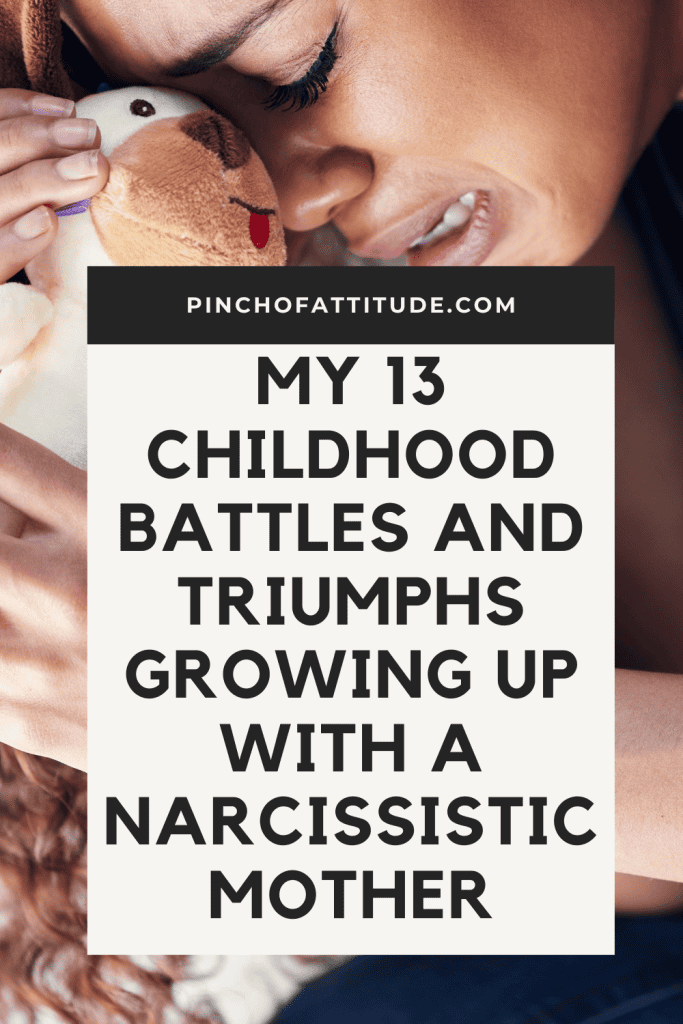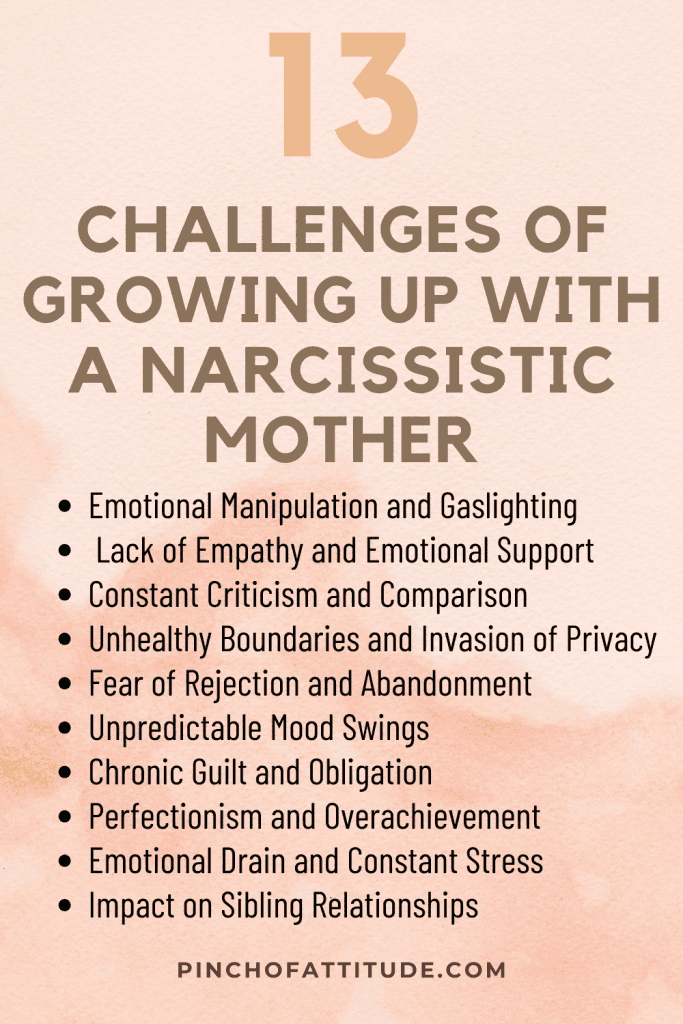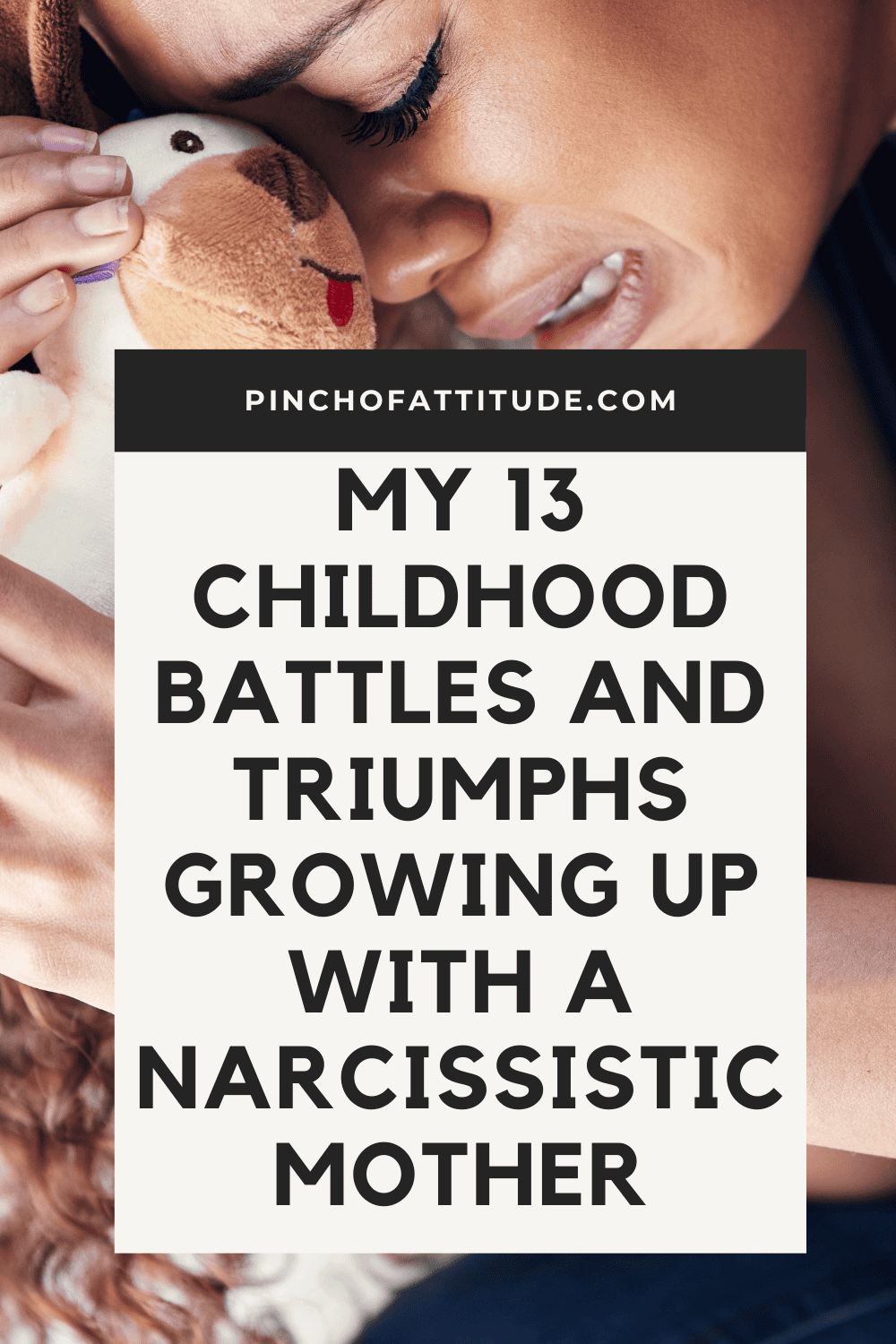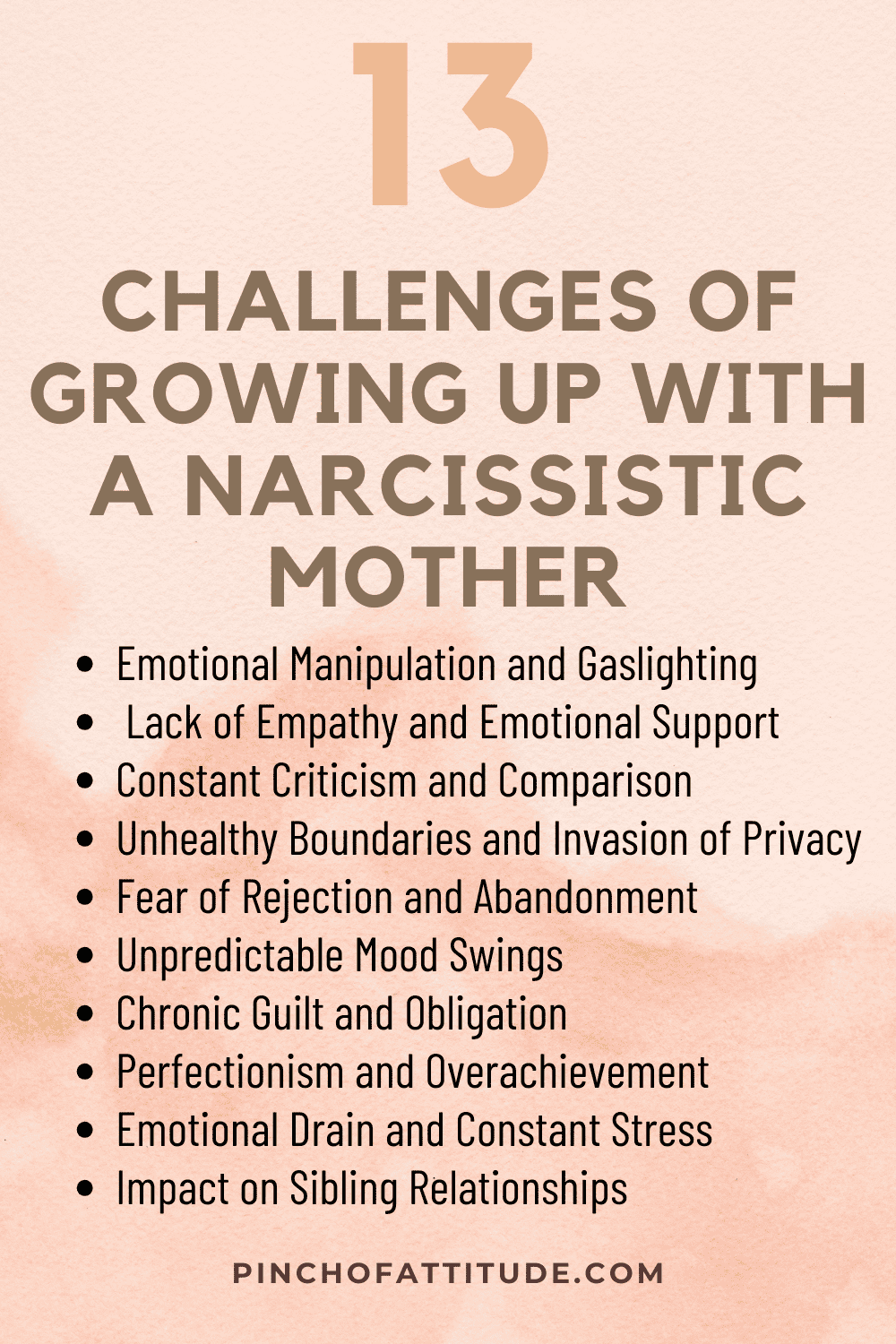Growing up with a narcissistic mother was a journey filled with unique challenges that tested my resilience and character.
As a child, I often found myself in a whirlwind of conflicting beliefs and unrealistic expectations.
Because in the world my mother painted, beauty was the ultimate currency, and those who didn’t possess it were deemed failures.
I, on the other hand, was the explorer, the black sheep of the family who dared to defy her rigid rules. That meant enduring her disapproval and often hurtful words and actions.
But it also meant discovering the strength within myself to withstand the storm of unrealistic expectations.
In hopes that my story can resonate with others who have faced similar struggles, let me take you through what I had to face being raised by a narcissistic parent.
- Growing up with a narcissistic mother can have profound and lasting effects on your emotional well-being and psychological development.
- Among the challenges faced by people who grew up with narcissistic mothers include emotional manipulation and the fear of rejection and abandonment.
- To cope with and heal from the effects of being raised by narcissists, it’s important to set boundaries and maintain composure in the face of unacceptable behavior.
Table of Contents
13 Things I Had to Overcome While Growing Up with a Narcissistic Mother

In the midst of my mother’s unrealistic expectations and ever-changing beliefs, I had to find my own path to authenticity.
I had to navigate the constant pressure to conform to her ideals of success, all while staying true to my adventurous and independent spirit.
But these challenges I faced were more than mere obstacles.
They were lessons that sculpted my identity, teaching me to remain true to myself in a world that often seemed at odds with my values and aspirations.
1. Emotional Manipulation and Gaslighting
Emotional manipulation and gaslighting were like a constant shadow over my childhood.
My mother always had a knack for distorting reality, making me question the validity of my feelings, perceptions, and even my sanity.
She expertly wielded guilt, blame, and shame as weapons, using them to manipulate and control my emotions.
It was a never-ending cycle of emotional turmoil where I struggled to distinguish between truth and her carefully crafted illusions.
Overcoming this required immense introspection and self-validation, as I learned to trust my instincts and untangle the web of manipulation.
It was a crucial step in reclaiming my sense of self.

2. Lack of Empathy and Emotional Support
Growing up with a narcissistic mother, emotional support was a rare commodity in my life.
I remember a time when I faced a devastating setback in school, hoping for a comforting word or a reassuring hug.
Instead, my mother’s response was a dismissive remark about how it shouldn’t bother me.
She dismissed my concerns without a second thought, leaving me to navigate the challenging task alone.
This experience and countless others like it etched into my memory, highlighting the emotional void that defined our relationship.
It was a stark reminder of the emotional isolation that often accompanied life in our household.

3. Constant Criticism and Comparison
In my mother’s eyes, it seemed as though no achievement or personal quality was ever good enough.
One distinct memory etched in my mind was when I proudly presented a school project I had worked tirelessly on, only to be met with a barrage of disparaging comments.
She effortlessly compared me to others, emphasizing their supposed superiority. That left me feeling perpetually inadequate.
These experiences left deep scars. It developed in me a persistent sense of self-doubt and insecurity that I had to grapple with as I navigated my formative years.
But I realized that my worth isn’t determined by others’ opinions. And that’s when I learned the importance of focusing on self-acceptance.

4. Unhealthy Boundaries and Invasion of Privacy
Being raised by a narcissistic parent brought a constant struggle with unhealthy boundaries and the invasion of privacy.
My mother’s need for control extended to every aspect of my life.
She had no qualms about rifling through my personal belongings, reading my diaries, or eavesdropping on private conversations.
The concept of personal space was nonexistent.
It was an emotionally suffocating environment where my autonomy was constantly under siege.
These experiences left me yearning for a sense of privacy and independence that felt elusive within the confines of our home.
However, they shaped my understanding of the importance of healthy physical and emotional boundaries that protect my personal life and well-being.

5. Fear of Rejection and Abandonment
Children of narcissists often find themselves constantly experiencing an overwhelming fear of rejection and abandonment.
In my own life, one vivid memory stands out, a moment when I hesitantly shared my dreams of pursuing a career in art.
I yearned for her support and approval, but her response was a chilling silence, punctuated by a dismissive laugh.
The fear of being rejected by my own mother became an ever-present specter, haunting my choices and relationships.
It was a weight I carried, fearing that if I didn’t conform to her expectations, I’d face her abandonment.

6. Unpredictable Mood Swings
Living with someone with a narcissistic personality disorder (NPD) meant navigating a rollercoaster of emotions.
One moment, she could be charming and affectionate, showering praise and affection, but in the blink of an eye, her mood would shift drastically.
These erratic mood swings were often triggered by perceived threats to her ego, leading to explosive outbursts, blame-shifting, or silent treatment.
In my life, this created an atmosphere of constant tension and uncertainty, where walking on eggshells became my survival strategy.
My mother’s mood swings were driven by her insatiable need for admiration and control.
And while I admit it wasn’t easy, understanding these narcissistic traits helped me cope with the emotional turbulence.

7. Chronic Guilt and Obligation
My mom’s manipulative tactics often left me feeling obligated to fulfill her needs and made to feel guilty when I couldn’t meet her unrealistic expectations.
It was a suffocating burden that affected every aspect of my life. I carried it like a heavy anchor, always fearing the consequences of not meeting her demands.
This experience taught me the importance of recognizing healthy boundaries and learning to prioritize my own well-being without succumbing to perpetual guilt and obligation.
Over time, I realized that unconditional love and support shouldn’t come with strings attached.
Self-care and emotional health should be my priorities, even if it means setting firm boundaries to protect myself.

8. Perfectionism and Overachievement
My mother’s narcissism caused her to have an insatiable need for external validation. And being her child meant she projected those unmet expectations onto me.
In her world, success was the only currency that mattered, and I was expected to excel in every facet of life to reflect well on her.
This constant push for perfection left me perpetually striving for unattainable standards.
It’s common for individuals with narcissistic traits to demand perfection from others, as they often use the achievements of those around them to bolster their own sense of self-worth.
This upbringing taught me the importance of setting realistic goals and valuing personal growth over external validation.

9. Emotional Drain and Constant Stress
Over the years, the relentless emotional rollercoaster my mother put me through left me perpetually drained and on edge.
Her unpredictable moods, unrelenting demands, and constant criticism created a toxic environment that sapped my energy and mental well-being.
It felt like I was carrying the weight of her expectations on my shoulders at all times. And these prolonged periods of stress took a toll on my health and happiness.
It was a harsh lesson in the importance of self-care, finding healthy outlets for stress, and seeking healthy coping mechanisms.

10. Impact on Sibling Relationships

Among the effects of being raised by a narcissistic mother is that the dynamic within our family was strained, with each of us coping in different ways.
My exploration and resistance to my mother’s unrealistic expectations set me apart as the “black sheep,” which sometimes created a divide.
While I found my own path to authenticity, I witnessed my siblings struggle with unhappiness, trying to meet our mother’s demands.
It was a complex and challenging situation that tested our bonds.
Over time, I learned the importance of open communication, empathy, and supporting each other in our individual journeys to heal and thrive.
11. Difficulty in Expressing Emotions
In a household where emotions were often weaponized or invalidated, I learned to keep my feelings tightly sealed.
Showing vulnerability felt like an invitation for judgment or exploitation. And this emotional suppression had lasting consequences on my ability to connect with others and myself.
It took time and effort to break free from this pattern, learning to validate and express my emotions in a healthy way.
Through therapy and supportive relationships, I discovered the power of emotional expression as a means of healing and forging genuine connections with others.

12. Finding It Hard to Build Relationships
Growing up in an environment marked by manipulation and emotional turmoil, I struggled to form healthy connections with others.
Trusting people became a daunting task because I still carried the scars of past betrayals and instability.
It took considerable effort to unlearn the patterns of distrust and fear.
But through self-reflection, therapy, and the support of understanding friends, I began to rebuild my capacity to trust and develop meaningful, authentic relationships.
This process taught me the importance of patience and self-compassion in forging genuine connections.

13. Breaking the Cycle
Breaking the cycle of narcissism that I grew up with was perhaps the most challenging yet transformative journey of my life.
Witnessing the destructive patterns in my family, I was determined not to perpetuate them.
It meant unearthing deep-seated beliefs and behaviors instilled by my mother, which were at odds with the person I wanted to become.
It involved setting firm boundaries, practicing self-awareness, and committing to ongoing self-improvement.
Breaking free from this cycle was a testament to my resilience and determination to lead a healthier, more fulfilling life.
It was a journey that empowered me to redefine my identity on my own terms.

What Are the Impacts of Growing Up with a Narcissistic Mother?
Growing up with a narcissistic elderly mother can leave lasting scars on a person’s emotional well-being and psychological development. I know this quite well myself.
The effects of such an upbringing can be far-reaching, influencing various aspects of an individual’s life and continuing into adulthood.
Below are some of the damaging impacts that my narcissistic mother had on me:
- Damaging effects: A narcissistic mother can cause serious psychological trauma to her children. They can develop issues like low self-esteem, trust issues, and difficulties in forming healthy relationships in adulthood.
- Self-centered behavior: These mothers often prioritize their own needs over their children’s, frequently belittling them to boost their own ego. Over time, this can lead to the suppression of the child’s ability to express themselves.
- Control and manipulation: Narcissistic mothers seek to control every aspect of their child’s life. They go to great lengths to undermine their achievements and use psychological manipulation to maintain dominance.
- Destruction of self-worth: The constant belittlement and control then hinder a child’s development of self-worth and independence.
- Lack of empathy: Narcissistic mothers often lack empathy, resulting in emotional neglect, gaslighting, and trivialization of the child’s feelings and achievements.
- Unrealistic expectations: These mothers set unattainable standards for their children, leading to feelings of being never good enough.
- Codependency: A narcissistic mother and her children often have an unhealthy codependent relationship, characterized by manipulation and an imbalance of power. The child becomes overly responsible for the mother’s emotional well-being.
- Conditional love: Love from a narcissistic mother is often conditional. It can be based on the child’s ability to meet specific criteria or reflect positively on the mother.
- Ambient abuse: Narcissistic mothers engage in ambient abuse, creating an environment of Fear, Obligation, and Guilt (FOG) for their children.
- Jealousy: These mothers often feel threatened by their children, leading to constant competition and belittlement.
- Long-term effects: Growing up with a narcissistic mother can result in various psychological issues in adulthood, including a fearful avoidant attachment style, difficulty setting boundaries, and even the risk of becoming narcissistic.
The path to healing and recovery involves acknowledging one’s feelings, seeking professional help, establishing boundaries, practicing self-care, and gaining an understanding of narcissistic behavior.
Tips for Having a Relationship With a Narcissistic Mother
Maintaining a relationship with a narcissistic mother can be challenging, but with careful strategies, it is possible to create a connection while protecting your own well-being.
Here are my five essential tips for navigating this complex relationship.
- Establish and maintain boundaries: Setting clear boundaries is crucial when dealing with a narcissistic mother. Decide what you’re comfortable with and stick to those boundaries, even when faced with resistance.
- Communicate off-limits topics: Let your mother know which topics are off-limits for discussion. This can help avoid triggering conflicts or emotional turmoil.
- Schedule quality time: Having a structured schedule for spending time with your mother can help manage expectations and reduce stress.
- Offer praise when deserved: Narcissists thrive on praise. So, acknowledging and appreciating her positive actions or behavior can promote a more positive dynamic.
- Avoid reacting to unacceptable behaviors: One of the most effective strategies is to avoid reacting emotionally to unacceptable behaviors. Maintain your composure and focus on self-care when confronted with challenging situations.
How I Survived Growing Up With My Narcissistic Mother
Surviving the challenging journey of growing up with my narcissistic mother required immense resilience and a few key strategies that helped me navigate the tumultuous waters.
First and foremost, I made a conscious choice not to embrace a victim mentality. Instead of allowing my mother’s narcissism to define me, I decided to rise above it.
This mindset shift empowered me to confront the challenges head-on and take control of my own life.
Another transformative step I took was curating my environment. I surrounded myself with authentic and kind individuals who became my support system.
These people served as a counterbalance to the toxicity I experienced at home, offering solace, understanding, and a sense of belonging.
Through this intentional cultivation of a positive support system and my steadfast determination to retain my sense of self, I not only survived the hardships of growing up with a narcissistic mother but thrived.
My ability to heal and grow from the trauma speaks volumes about my resilience and capacity to create a brighter, more fulfilling future on my own terms.
Related Posts:
- Narcissist Mother: Signs, Effects, What Works & How I Handle My Own Mother?
- 25 Characteristics of a Narcissistic Mother: You’re Not Alone
- How to Deal With a Narcissist Mother: I Overcame, Let Me Show You How
- 13 Tips on How I Deal With My Narcissistic Mother Guilt Trip
- Cut Off Narcissistic Mother: How I Finally Cut Ties With Her After 30 Years of Hell
Frequently Asked Questions
How can you overcome the emotional manipulation and gaslighting?
Overcoming emotional manipulation and gaslighting from a narcissistic mother requires introspection and self-validation. Trust your instincts, document interactions, and seek support from friends or professionals who can provide an objective perspective.
What should you do if you grew up with a lack of empathy and emotional support?
Seek emotional support from trusted friends, mentors, or therapists who can provide understanding and validation. Surround yourself with individuals who genuinely listen and empathize to help fill the emotional void left by a narcissistic parent.
How can you deal with constant criticism and comparison?
Surround yourself with supportive individuals who appreciate you for who you are to counteract the negativity. Set your own standards and goals, and celebrate your achievements, no matter how small, to build self-acceptance.
What steps can you take to set healthy boundaries and protect your privacy?
Assert your need for personal space and privacy calmly but firmly. Communicate your boundaries, emphasizing the importance of respecting your autonomy, to establish both physical and emotional boundaries.
How can you address the fear of rejection and abandonment?
Seek support from friends and professionals who can validate your worth and provide a safe space to express your feelings. Remember that your value isn’t dependent on one person’s approval.




